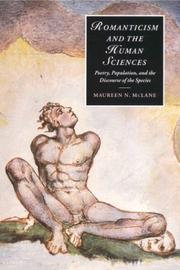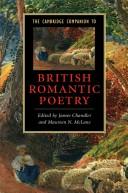| Listing 1 - 7 of 7 |
Sort by
|

ISBN: 0521773482 0511310501 0511151144 128015473X 0511049943 0511484399 0511118511 1107119901 0511010842 9780511010842 0511034695 9780511034695 9780511118517 9780521773485 9780511484391 9780511049941 9780511151149 9781280154737 9780521028202 0521028205 Year: 2000 Publisher: Cambridge [England] New York Cambridge University Press
Abstract | Keywords | Export | Availability | Bookmark
 Loading...
Loading...Choose an application
- Reference Manager
- EndNote
- RefWorks (Direct export to RefWorks)
This study, published in 2000, examines the dialogue between Romantic poetry and the human sciences of the period. Maureen McLane reveals how Romantic writers participated in a new-found consciousness of human beings as a species, by analysing their work in relation to discourses on moral philosophy, political economy and anthropology. Writers such as Wordsworth, Coleridge, Mary Shelley and Percy Shelley explored the possibilities and limits of human being, language and hope. They engaged with the work of theorisers of the human sciences - Malthus, Godwin and Burke among them. The book offers original readings of canonical works, including Lyrical Ballads, Frankenstein and Prometheus Unbound, to show how the Romantics internalised and transformed ideas about the imagination, perfectibility, immortality and population which so energised contemporary moral and political debates. McLane provides a defence of poetry in both Romantic and contemporary theoretical terms, reformulating the predicament of Romanticism in general and poetry in particular.
English literature. --- English literature - 19th century - History and cr. --- Literature and anthropology. --- Literature and society. --- Population in literature. --- Romanticism. --- Social problems in literature. --- Social sciences. --- English literature --- Literature and society --- Literature and anthropology --- Social sciences --- Social problems in literature --- Romanticism --- Population in literature --- English Literature --- English --- Languages & Literatures --- History and criticism --- History --- History and criticism. --- Behavioral sciences --- Human sciences --- Sciences, Social --- Social science --- Social studies --- Anthropology and literature --- Civilization --- Anthropology --- Arts and Humanities --- Literature

ISBN: 9780521862356 9780521680837 0521680832 0521862353 9781139001922 1139001922 1139817639 Year: 2008 Volume: *136 Publisher: Cambridge: Cambridge university press,
Abstract | Keywords | Export | Availability | Bookmark
 Loading...
Loading...Choose an application
- Reference Manager
- EndNote
- RefWorks (Direct export to RefWorks)
More than any other period of British literature, Romanticism is strongly identified with a single genre. Romantic poetry has been one of the most enduring, best loved, most widely read and most frequently studied genres for two centuries and remains no less so today. This Companion offers a comprehensive overview and interpretation of the poetry of the period in its literary and historical contexts. The essays consider its metrical, formal, and linguistic features; its relation to history; its influence on other genres; its reflections of empire and nationalism, both within and outside the British Isles; and the various implications of oral transmission and the rapid expansion of print culture and mass readership. Attention is given to the work of less well-known or recently rediscovered authors, alongside the achievements of some of the greatest poets in the English language: Wordsworth, Coleridge, Blake, Scott, Burns, Keats, Shelley, Byron and Clare.
Poetry --- English literature --- anno 1700-1799 --- anno 1800-1899 --- English poetry --- History and criticism --- Romanticism --- Pseudo-romanticism --- Romanticism in literature --- Aesthetics --- Fiction --- Literary movements --- 820-1 --- 82.015.55 --- 82.015.55 Literaire stromingen: romantiek --- Literaire stromingen: romantiek --- 820-1 Engelse literatuur: poëzie --- Engelse literatuur: poëzie --- English poetry - 19th century - History and criticism - Handbooks, manuals, etc --- English poetry - 18th century - History and criticism - Handbooks, manuals, etc
Book

ISBN: 0691225974 9780691225975 0691204470 0691230684 Year: 2021 Publisher: Princeton, NJ
Abstract | Keywords | Export | Availability | Bookmark
 Loading...
Loading...Choose an application
- Reference Manager
- EndNote
- RefWorks (Direct export to RefWorks)
Ways of Hearing is a book for our times that celebrates the infinite ways music enhances our lives.Contributors include: Laurie Anderson, Jamie Barton, Daphne Brooks, Edgar Choueiri, Jeff Dolven, Gustavo Dudamel, Edward Dusinberre, Corinna da Fonseca-Wollheim, Frank Gehry, Ruth Bader Ginsburg, Jane Hirshfield, Pico Iyer, Alexander Kluge, Nathaniel Mackey, Maureen McLane, Alicia Hall Moran, Jason Moran, Paul Muldoon, Elaine Pagels, Robert Pinsky, Richard Powers, Brian Seibert, Arnold Steinhardt, Susan Stewart, Abigail Washburn, Carrie Mae Weems, Susan Wheeler, C. K. Williams, and Wu Fei. They sound the depths of a remarkable range of musical genres, including opera, jazz, bluegrass, and concert music both classical and contemporary.This expansive volume spans styles and subjects, including Pico Iyer's meditations on Handel, Arnold Steinhardt's thoughts on Beethoven's Grosse Fuge, and Laurie Anderson and Edgar Choueiri's manifesto for spatial music. Richard Powers discusses the one thing about music he's never told anyone, Daphne Brooks draws sonic connections between Toni Morrison and Cécile McLorin Salvant, and Ruth Bader Ginsburg reveals what she thinks is the sexiest duet in opera. Poems interspersed throughout further expand how we can imagine and respond to music. . An outstanding anthology in which notable musicians, artists, scientists, thinkers, poets, and more-from Gustavo Dudamel and Carrie Mae Weems to Ruth Bader Ginsburg and Paul Muldoon-explore the influence of music on their lives and workWhat happens when extraordinary creative spirits-musicians, poets, critics, and scholars, as well as an architect, a visual artist, a filmmaker, a scientist, and a legendary Supreme Court justice-are asked to reflect on their favorite music? The result is Ways of Hearing, a diverse collection that explores the ways music shapes us and our shared culture. These acts of musical witness bear fruit through personal essays, conversations and interviews, improvisatory meditations, poetry, and visual art. .
Digital

ISBN: 9780691225975 Year: 2021 Publisher: Princeton, N.J. Princeton University Press
Abstract | Keywords | Export | Availability | Bookmark
 Loading...
Loading...Choose an application
- Reference Manager
- EndNote
- RefWorks (Direct export to RefWorks)


ISBN: 9780748630646 9780748624812 Year: 2006 Publisher: Edinburgh Edinburgh University Press
Abstract | Keywords | Export | Availability | Bookmark
 Loading...
Loading...Choose an application
- Reference Manager
- EndNote
- RefWorks (Direct export to RefWorks)
Book

ISBN: 9780674054219 Year: 2021 Publisher: Cambridge, MA
Abstract | Keywords | Export | Availability | Bookmark
 Loading...
Loading...Choose an application
- Reference Manager
- EndNote
- RefWorks (Direct export to RefWorks)
Digital

ISBN: 9780674054219 Year: 2021 Publisher: Cambridge, Mass. Harvard University Press
Abstract | Keywords | Export | Availability | Bookmark
 Loading...
Loading...Choose an application
- Reference Manager
- EndNote
- RefWorks (Direct export to RefWorks)
| Listing 1 - 7 of 7 |
Sort by
|

 Search
Search Feedback
Feedback About UniCat
About UniCat  Help
Help News
News